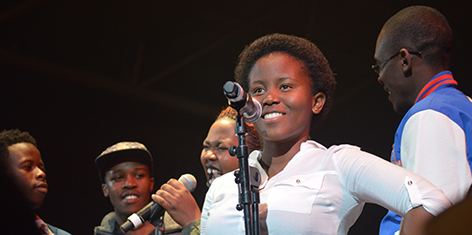Latest News Archive
Please select Category, Year, and then Month to display items
12 January 2024
|
Story Nonsindiswe Qwabe
|
Photo Sonia Small
 Since joining the UFS in 2008, Dr Grey Magaiza has worked extensively on approaches that can foster the socio-economic transformation of societies.
Since joining the UFS in 2008, Dr Grey Magaiza has worked extensively on approaches that can foster the socio-economic transformation of societies.
“The future should be one where communities can decide on their development agenda and futures. That’s the most important for me.” Dr Grey Magaiza, Deputy Director of the Centre for Gender and Africa Studies (CGAS) and Head of the Community Development programme on the Qwaqwa Campus, is passionate about capacitating communities to be agents of change and advancement. His vision for the future emphasises the empowerment of communities to take charge of their development by actively participating in decision making and the implementation of development projects that can improve their lives.
Since joining the UFS in 2008, Dr Magaiza has worked extensively on approaches that can foster the socio-economic transformation of societies. Over the years, he has crafted his research speciality into one that he is most proud of – being an interdisciplinary scientist immersed in the development of communities.
“I’m in a fortunate position of researching what I like. I say ‘fortunate’, because I’ve taken the time to understand what I’m passionate about, which is the overall field of rural livelihoods and livelihood futures – in short, community development. My research starts from an engaged university, understanding the elements that a university must use to enhance transformation and relevance to its immediate community in terms of development.”
One of the ways he has done this is by looking at social entrepreneurship as a development approach for young people in a rural setting. Through workshops with non-profit and civic organisations in Qwaqwa, Dr Magaiza has been helping these organisations to map out their needs and actively meet them through the involvement and support of external role players.
“We understand that communities are part of the national development agenda, but even that national agenda respects community knowledge and intentions and allows communities to shape their identity. A critical enabler of this is community organising. You bring back the capacity in communities to have dialogues on issues affecting them as spaces for engagement, knowledge exchange, and for people to just talk about their way forward.”
By enabling communities to define their development agenda, they can address their specific needs, challenges, and aspirations, he said. “When I look at livelihood futures, it’s quite an exciting aspect of my work – it’s like looking into a fortune tellers’ globe, because you’re not deciding for communities what they should do, but the communities themselves take those decisions.”
I-DENT-I-TIES tackles identity in an unusual story-telling style
2016-07-26
 One of the leading performers, Baanetse Mokhotla.
One of the leading performers, Baanetse Mokhotla.
Photo: Thabo Kessah
The I-DENT-I-TIES project has been an enormous experience for the Qwaqwa Campus students who were part of this large-scale interdisciplinary performance project. This is according to Baanetse Mokhotla, one of the leading performers.
“I have personally learnt a lot about performing arts and also grew as an individual,” Baanetse said about the production that was part of this year’s Vrystaat Arts Festival in Bloemfontein.
This massive interactive production of the 54-member student cast utilises music, song and dance in an unusual method of story-telling. It uses live video camera feeds on two big screens as well as recorded video clips of the cast itself and members of the community, some of whom were part of the audience during the two shows staged on the Qwaqwa Campus. The cast intermittently mingles with the audience, thus allowing the latter to be part of the narrative as well.
The main story line explores issues around identity while using the famous Basotho story of ‘Moshanyana Sankatana’ as a catalyst.
Two of the capturing features are the live interviews and the narration of the animated ‘Moshanyana Sankatana’ story, creating stories within a story.
Commenting about the project, SRC President Paseka Sikhosana said that he was happy to have led the student community during this proud moment.
“I loved how this show has exposed our enormously talented performers to the world. It was magical and we need more of such to ensure there will never be a dull moment on our campus,” he said.
Sociology lecturer Sivuyisiwe Magayana said: “I-DENT-I-TIES production was fresh fun. It exhibited the fact that we should be appreciative of other's differences. It also emphasised that we should move away from subscribing to an 'in-group' and 'out-group' mentality when it comes to issues of race, sexuality and identity.”
The international creative team behind this project included a New York-based Dutch director, Erwin Maas; Vienna-based Dutch theatre designer, Nico de Rooij; Djana Covic, a Serbian performance-craft-artist based in Vienna; and South African film and stage legend Jerry Mofokeng.